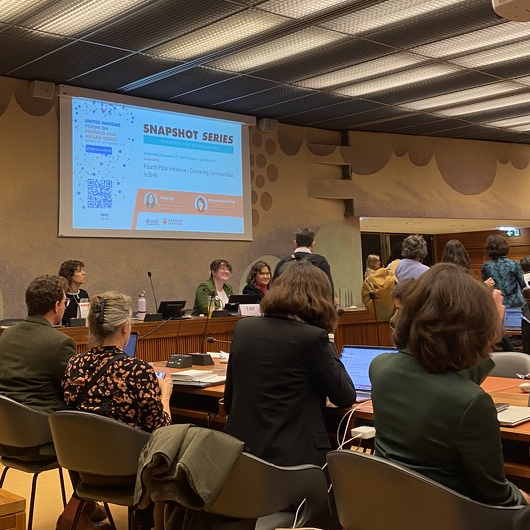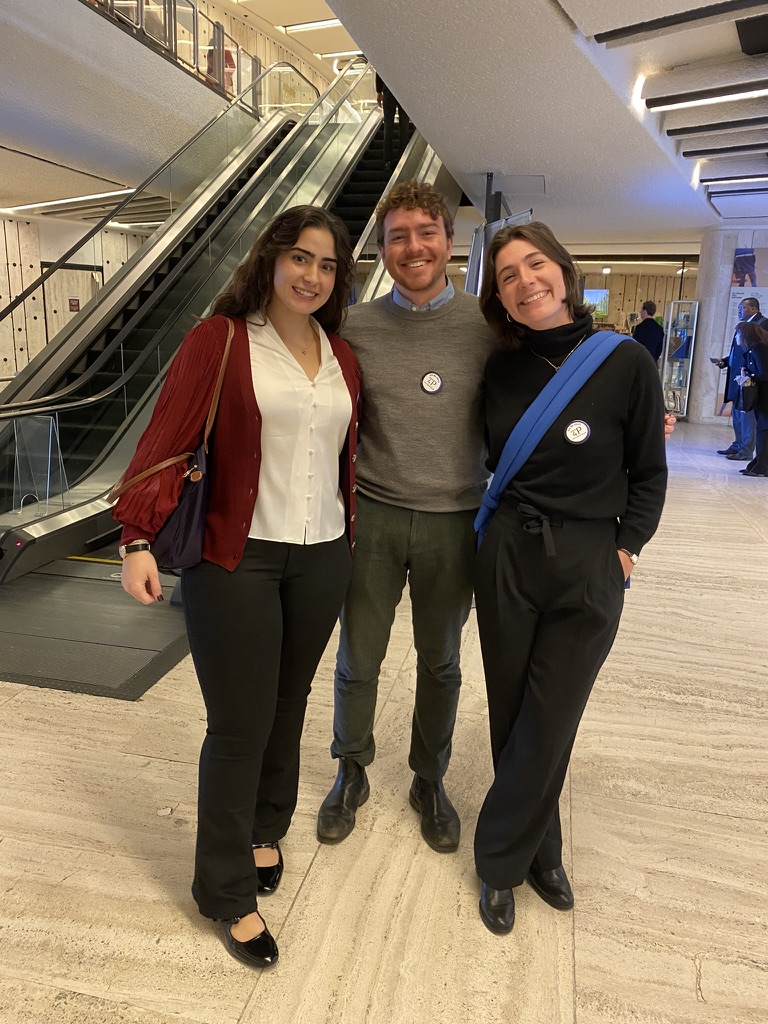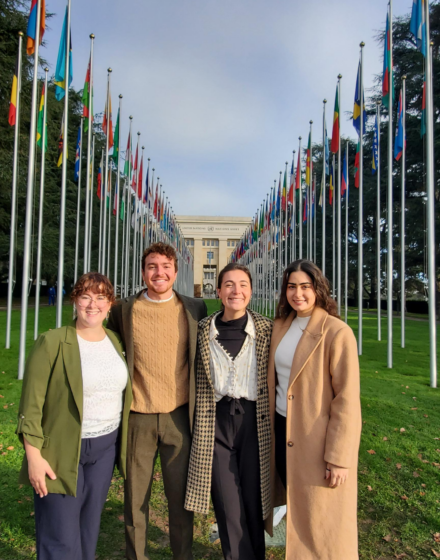In the Human Rights Entrepreneurs Clinic, students bring their creative and entrepreneurial thinking to bear on projects seeking to advance justice and accountability worldwide. Alongside clinical fellow Emily Ray ’21, students had the opportunity to broaden their global perspective on a trip to Geneva, Switzerland, where Ray presented at the United Nations’ Forum on Business and Human Rights. In addition from cheering on and learning from Ray at her panel, students Sumaya Daghestani ’26, Abigail Judge ’26, and Quincy Tichenor ’26 networked with human rights advocates from across the globe and attended presentations from global leaders.
We caught up with Abigail Judge to hear more about the U.N. visit, her takeaways from the Forum, and what she has valued about the clinic experience.
Office of Clinical and Pro Bono Programs (OCP): What motivated you to join the Human Rights Entrepreneurs Clinic (HREC)? What has your experience in the clinic been like?
Abigail Judge: I wanted to try out a clinic that focused on international law and knew that HREC had projects related to corporate accountability and climate change. The clinic provides phenomenal opportunities to get involved with human rights work; beyond the trip to Geneva, I’ve also co-written an amicus brief, assisted on human rights litigation projects, and helped draft a novel human right definition. HREC encourages and spotlights creative legal thinking, which makes the team projects extremely rewarding. You get to feel real ownership over a project while still getting the guidance and support of a clinic structure.

OCP: Please tell us about your experience traveling to Geneva for the United Nations Forum on Business and Human Rights. How did the clinic participate in the forum?
Judge: HREC wanted to spotlight the Fourth Pillar Initiative, which aims to more explicitly center communities in all aspects of business and human rights (more information on the Fourth Pillar is linked here). Emily Ray, the HREC clinical fellow, had the opportunity to speak about the Fourth Pillar Initiative at one of the forum sessions alongside Pichamon Yeophantong, current Chairperson of the U.N. Working Group on Business and Human Rights. Quincy, Sumaya, and I travelled with her to help with networking and socializing the Fourth Pillar Initiative. We were excited to see a great response to the Initiative from different people at the forum; we felt like there was an appetite for community-centric perspectives and like this tool could be used by different stakeholders to make real impacts. The Fourth Pillar even got a shout-out at the forum’s closing plenary session!
OCP: How did the clinic prepare you to be a part of this international forum? Were there specific skills or knowledge areas you developed beforehand?
Judge: Our preparation focused on building subject matter expertise so that we could properly introduce and explain the Fourth Pillar Initiative to other forum attendees. The Fourth Pillar Initiative references the UN Guiding Principles on Business and Human Rights, which propose three pillars in business and human rights: protect, respect, and remedy. So, to be able to talk about it effectively, we wanted to have expertise in not just the specific principles articulated by the Fourth Pillar project, but also its larger context.
OCP: What was the most surprising or unexpected insight you gained from interacting with international stakeholders at the forum?

Judge: I got a genuinely new perspective on the value of informal networking. People are at the forum to learn and engage with new ideas, so we would be having these super deep conversations with strangers in line at the water fountain. The forum platformed a whole swath of different perspectives (governments, civil society organizations, businesses, academics, community organizers, etc.), so everybody’s first question about the Fourth Pillar was different. It is a lot of fun to be networking on behalf of a project. I got to understand a real practical vision of different perspectives within the Business and Human Rights field.
OCP: What was it like to not only travel to the UN, but participate in conversations with global human rights leaders, as a law student? What were your biggest takeaways from that opportunity?
Judge: The trip was such a rewarding experience. I got to talk to attorneys working on international climate cases that I had written about, which was surreal. It feels heavy to face off against enormous problems like climate change or supply chain human rights abuses, but there are also near-infinite ways of chipping away at those issues. The forum was mobilizing beyond all else—I came away from it feeling energized about what we might be able to do in the clinic, within and beyond the Fourth Pillar Initiative.
Filed in: Clinical Spotlight
